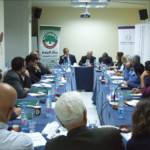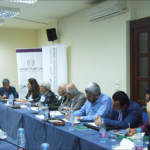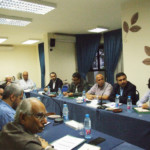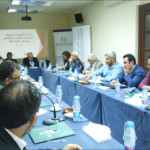Al-Zaytouna Centre for Studies and Consultations and the Lebanese Palestinian Dialogue Forum of the Common Space Initiative held a panel discussion entitled “Plans to Liquidate UNRWA: Context, Dimensions, Prospects and Ways of Confrontation,” on 26/4/2018, with the participation of experts and specialists in Palestinian and Lebanese affairs.
The discussion was kicked off by the General-Manager of al-Zaytouna Centre Dr. Mohsen Mohammad Saleh, who welcomed the attendees and stressed on the importance of providing a decent life and environment for Palestinian refugees in Lebanon. Saleh considered that the right of return is an inherent right since the occupation of Palestine and the displacement of its people, confirming that the United Nations (UN) General Assembly Resolution 194 emphasized that right.
In his paper “Information Paper: Historical Background, Political Context and Current Representations,” Jaber Sulaiman explained the historical context of the establishment of UN Relief and Works Agency for Palestine Refugees in the Near East (UNRWA) and plans aiming to eliminate the refugees issue, by integrating and resettling them in refuge countries. He also discussed the plans to liquidate UNRWA after signing the Oslo Accords, and its prospects. His recommendations and suggestions discussed how to deal with those scenarios.
Lebanese MP Dr. Farid Elias El Khazen commented that the UNRWA crisis cannot be separated from the current situation, where US administration’s decision to recognize Jerusalem as the capital of Israel has an impact on ending and liquidating UNRWA. The US decision practically means recognizing the de facto policy of eliminating the two-state solution and the right of return. El-Khazen pointed out that the consistent international approach concerning UNRWA is to integrate Palestinian refugees into their societies, and abolishing the right of return. Thus, holding the international community, not Israel, the full responsibility.
Researcher Suhail al-Natour commented that canceling the UNRWA means revoking the right of return and encouraging the Palestinian negotiator to follow suit. Al-Natour warned that this policy would oppose the policy of refuge countries.
Dr. Shafiq Shu‘aib, member of the Lebanese Palestinian Dialogue Committee (LPDC), highlighted the importance of the UNRWA, not only because of its impact on the Palestine issue, but also because it will affect all Arab components, especially countries hosting Palestinian refugees. In Lebanon, for example, the issue of asylum is considered a Lebanese national issue that affects Lebanese interests.
LPDC Representative Zuhair Al-Hawari commented that liquidation of UNRWA is the result of international, regional and Palestinian interactions. He warned of the ramifications such a plan would have on Palestinian schism and the right of return. Regarding the results of the 2017 National Population and Housing Census of Palestinian Camps and Gatherings in Lebanon, the total population of Palestinian Refugees amounted 174 thousand, which is much less than the UNRWA figures of about 532 thousand. Hawari considers the serious question that must be asked is why did this massive number of Palestinians emigrate from Lebanon after the Israeli invasion of Lebanon in 1982. The answer is because of the Lebanese policies that denied the Palestinian refugees many rights, including the right to ownership and the right to work.
Ali Huwaidi called for taking advantage of the period, when the term of chair of the UN Legal Committee, Danny Danon, ends. For he has been an obstacle to passing projects supporting UNRWA.
Yasser Ali said that the right of return could be weakened with the termination of UNRWA’s work, however, UNRWA is an international witness and not the sole political one. He added that it is difficult for any post-Trump US administration to rehabilitate what has been done against the Palestine issue and against UNRWA, and the Israeli Prime Minister Netanyahu, is taking advantage of that.
‘Amr Sa‘dedin, the researcher at the Institute for Palestine Studies, called for giving importance to the partnership between the Palestinian civil society and UNRWA, citing the experience of the reconstruction of Nahr al-Bared Refugee Camp in northern Lebanon, which had positive results on the reconstruction process.
The researcher at al-Zaytouna Centre Wael Sa‘ad warned of the danger of depriving the Palestinian refugees in Lebanon of their civil rights, for that will push them to accept other solutions that will not be in their favor or the Lebanese state’s.
Participants agreed that targeting UNRWA aims at weakening the Palestinian people and the return process, whereas the right of return can’t be weakened since it is an inherent right.
Moderated by Dr. Shafiq Shu‘aib, the second session discussed the scenarios and recommendations, where three related scenarios were highlighted:
1- UNRWA would pass the crisis.
2- Paralyzing UNRWA and disrupting its role.
3- Changing UNRWA’s mandate and merging it into UNHCR.
Experts stressed the need to find ways to counteract each scenario, emphasizing the need for the participation of all Palestinians in confronting the liquidation plans of the Palestinian issue and the UNRWA. The role of Palestinian refugees, their awareness and motivation must be focused on. They considered that there is a dire need today to revive the role of host countries in UNRWA’s policies. Refugees and UNRWA must enjoy a welcoming environment in these countries, which must fully coordinate with the international community, and mainly with friendly countries. They stressed the importance of setting priorities and approaching the problems that can be solved in the near future.









Leave A Comment